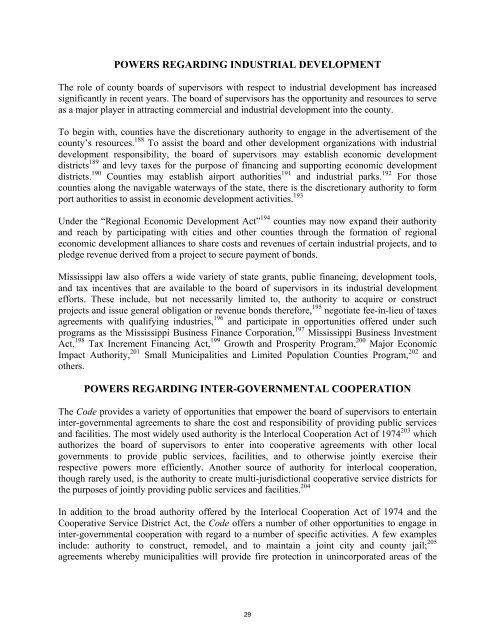in Mississippi
m2078-county-gov-ms
m2078-county-gov-ms
Create successful ePaper yourself
Turn your PDF publications into a flip-book with our unique Google optimized e-Paper software.
POWERS REGARDING INDUSTRIAL DEVELOPMENT<br />
The role of county boards of supervisors with respect to <strong>in</strong>dustrial development has <strong>in</strong>creased<br />
significantly <strong>in</strong> recent years. The board of supervisors has the opportunity and resources to serve<br />
as a major player <strong>in</strong> attract<strong>in</strong>g commercial and <strong>in</strong>dustrial development <strong>in</strong>to the county.<br />
To beg<strong>in</strong> with, counties have the discretionary authority to engage <strong>in</strong> the advertisement of the<br />
county’s resources. 188 To assist the board and other development organizations with <strong>in</strong>dustrial<br />
development responsibility, the board of supervisors may establish economic development<br />
districts 189 and levy taxes for the purpose of f<strong>in</strong>anc<strong>in</strong>g and support<strong>in</strong>g economic development<br />
districts. 190 Counties may establish airport authorities 191 and <strong>in</strong>dustrial parks. 192 For those<br />
counties along the navigable waterways of the state, there is the discretionary authority to form<br />
port authorities to assist <strong>in</strong> economic development activities. 193<br />
Under the “Regional Economic Development Act” 194 counties may now expand their authority<br />
and reach by participat<strong>in</strong>g with cities and other counties through the formation of regional<br />
economic development alliances to share costs and revenues of certa<strong>in</strong> <strong>in</strong>dustrial projects, and to<br />
pledge revenue derived from a project to secure payment of bonds.<br />
<strong>Mississippi</strong> law also offers a wide variety of state grants, public f<strong>in</strong>anc<strong>in</strong>g, development tools,<br />
and tax <strong>in</strong>centives that are available to the board of supervisors <strong>in</strong> its <strong>in</strong>dustrial development<br />
efforts. These <strong>in</strong>clude, but not necessarily limited to, the authority to acquire or construct<br />
projects and issue general obligation or revenue bonds therefore, 195 negotiate fee-<strong>in</strong>-lieu of taxes<br />
agreements with qualify<strong>in</strong>g <strong>in</strong>dustries, 196 and participate <strong>in</strong> opportunities offered under such<br />
programs as the <strong>Mississippi</strong> Bus<strong>in</strong>ess F<strong>in</strong>ance Corporation, 197 <strong>Mississippi</strong> Bus<strong>in</strong>ess Investment<br />
Act, 198 Tax Increment F<strong>in</strong>anc<strong>in</strong>g Act, 199 Growth and Prosperity Program, 200 Major Economic<br />
Impact Authority, 201 Small Municipalities and Limited Population Counties Program, 202 and<br />
others.<br />
POWERS REGARDING INTER-GOVERNMENTAL COOPERATION<br />
The Code provides a variety of opportunities that empower the board of supervisors to enterta<strong>in</strong><br />
<strong>in</strong>ter-governmental agreements to share the cost and responsibility of provid<strong>in</strong>g public services<br />
and facilities. The most widely used authority is the Interlocal Cooperation Act of 1974 203 which<br />
authorizes the board of supervisors to enter <strong>in</strong>to cooperative agreements with other local<br />
governments to provide public services, facilities, and to otherwise jo<strong>in</strong>tly exercise their<br />
respective powers more efficiently. Another source of authority for <strong>in</strong>terlocal cooperation,<br />
though rarely used, is the authority to create multi-jurisdictional cooperative service districts for<br />
the purposes of jo<strong>in</strong>tly provid<strong>in</strong>g public services and facilities. 204<br />
In addition to the broad authority offered by the Interlocal Cooperation Act of 1974 and the<br />
Cooperative Service District Act, the Code offers a number of other opportunities to engage <strong>in</strong><br />
<strong>in</strong>ter-governmental cooperation with regard to a number of specific activities. A few examples<br />
<strong>in</strong>clude: authority to construct, remodel, and to ma<strong>in</strong>ta<strong>in</strong> a jo<strong>in</strong>t city and county jail; 205<br />
agreements whereby municipalities will provide fire protection <strong>in</strong> un<strong>in</strong>corporated areas of the<br />
29


